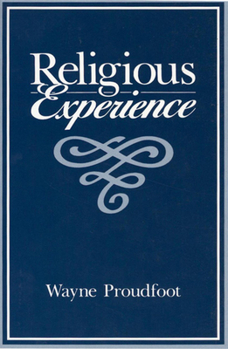Religious Experience
Select Format
Select Condition 
Book Overview
How is religious experience to be identified, described, analyzed and explained? Is it independent of concepts, beliefs, and practices? How can we account for its authority? Under what conditions... This description may be from another edition of this product.
Format:Paperback
Language:English
ISBN:0520061284
ISBN13:9780520061286
Release Date:September 1987
Publisher:University of California Press
Length:290 Pages
Weight:0.75 lbs.
Dimensions:0.6" x 5.5" x 8.3"
Related Subjects
Christian Books & Bibles Christianity Church History Churches & Church Leadership Comparative Religion Earth-Based Religions Education & Reference Humanities Native American Native American Studies Other Religions, Practices & Sacred Texts Politics & Social Sciences Religion Religion & Spirituality Religious Studies Social Sciences Specific Demographics Spirituality Textbooks Theology Tribal & EthnicCustomer Reviews
3 ratings
A cautionary tale
Published by Thriftbooks.com User , 17 years ago
If you approach Religious Experience intent on debunking authoritative perspectives on what religious experience consists of, you won't be disappointed by Proudfoot's deconstruction of Schleiermacher, James, and others. The vast majority of the book concerns itself with citing these other thinkers and explaining why none of their paradigms holds up to close scrutiny. Proudfoot's scalpel is sharp and polished, but the dominance of slicing over building results in a handful of scraps that would benefit from a better reintegration and innovation than Proudfoot is able to offer. Regardless, an illuminating and entertaining read.
a wonderful pragmatic exploration of religious experience.
Published by Thriftbooks.com User , 22 years ago
I think, EMD, that you need to read the book a third time...
A Phenomenology of Religious Experience
Published by Thriftbooks.com User , 23 years ago
Proudfoot's book quickly shot him into the pantheon of very important philosophers of religious experience, most notably Schleiermacher, James, and Otto. As a matter of fact, I think that if you were to teach a course on Western scholarly notions of religious experience, you could do so very well using only these four authors: Schleiermacher's Religion: Speeches to Its Cultured Despisers; James's Varieties of Religious Experience; Otto's The Idea of the Holy; and Proudfoot. That may seem like a lot to assert, but for historical as well as ideological reasons, these four books are largely representative of the discipline for the last several hundred years.I had to read this book twice. Not because of the difficulty of the work: it's not difficult or technical at all. No, I misunderstood Proudfoot's argument early on, and therefore I came away hating the book and wondering why on earth I read it. My first impression was that Proudfoot was giving the old reductionistic viewpoint that all that is going on in any religious experience is projection. And he does say, very explicitly, that previous expectations determine the outcome of religious experiences. But he does not say that that is ALL that is happening; that was my erroneous reading of Proudfoot. Many others have also had that negative reaction to his book, so I was not completely alone in my initial rejection of his work.What he really seems to be saying, and a second reading made this clear as day, is that there is no "pure" experience of God, no unmediated approach to the Holy, the Numinous, Being, or what have you, in direct contradiction of Schleiermacher. This view is just plain old Kant, of course, but in light of modern and postmodern hermeneutics, it is, of couse, exactly right. It is not that that, for example, the charismatic Pentacostal does not legitimately experience "the Divine:" it is, however, that she does so within the framework already given to her from her tradition. Within that tradition, however, the experience may well be "pure," in terms of the tradition. Two classic examples are Teresa's "mystical marriage" to God and, on the other end of the spectrum, Dante's Beatific Vision of God as Other. These two examples are experiences of God, both radically different (one very personal, one very impersonal), both mediated through particular cultural Weltbildungen, and both "legitimate" by anyone's definition. The same holds true across the board, from Sufi dancing to zazen: there is an expected outcome towards which masters or teachers guide students and devotees, and successful "experiences" take place within these defined areas. This certainly does not lessen the experience at all. Quite the contrary, it may well heighten the experience, since it gives a sense of "attainment." To some this will sound like "you find what you expect to find"; Proudfoot himself likely would say this. But as a phenomenological stance, this is a respectful yet critical accout of human religiosity





